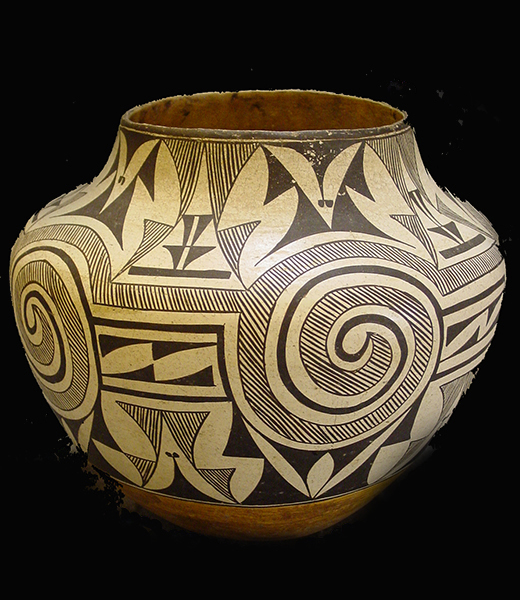IUMAA Awarded NEH Grant To Develop Exhibits with Native American Scholars
May 11, 2022
Native American scholars will work with staff from the new IU Museum of Archaeology and Anthropology over the next year to study and prototype new approaches to exhibiting Native American artifacts.
The project is in preparation for the museum’s opening in 2023, and work will focus on how the museum can make open (or visible) storage, an exhibition technique that uses casework to display large numbers of artifacts with limited contextual information, more Indigenous and less colonial.
“Visible storage is a technique that some scholars and visitors find problematic because it communicates implicit messages about the colonial nature of archaeological collections and perpetuates the idea of museums as cabinets of curiosity,” said Ed Herrmann, executive director of the museum. “The NEH funding will help us modernize the approach to take Indigenous perspectives into account while developing our educational and public exhibits. Additionally, the project may serve as a model for work with other groups from around the world, as the museum holds global collections.”
In order to create a contemporary approach to open storage, IUMAA staff will work with Native scholars to develop guidelines that ensure the careful, respectful and inclusive representation of Native peoples and their materials, and they will create a mechanism that will facilitate ongoing conversation between Native people and museum staff. This will enable the museum to add new knowledge to the objects’ records, correct erroneous records and better interpret collections from the Indigenous perspectives of its collaborators.
“Tribally mandated collections access and care policies culminate in wise and beneficial storage design for all, improving the fair and equitable representation of the rich heritages of our peoples as well as forwarding the understanding of our cultural norms and world views,” said Jessie Ryker-Crawford (White Earth Chippewa), the interim director of the Master of Fine Arts Cultural Administration Program at the Institute of American Indian Arts. Ryker-Crawford will be the lead consultant for the project.
Sarah Junk Hatcher, head of programs and education at the museum, said the project continues efforts of the IU Museum of Archaeology and Anthropology to work more closely with indigenous groups to help educate others on these important artifacts and history.
“The IU Museum of Archaeology and Anthropology has been working closely with Tribal colleagues over the last few years, and we are privileged to build on these relationships to do this important work,” Hatcher said. “It is really exciting to be a part of a project that will work to incorporate traditional knowledge and new understandings into this new institution.”
The project is funded by a $72,000 grant from the National Endowment for the Humanities, one of 245 awarded this year by the federal agency. “These projects will expand the horizons of our knowledge of culture and history, lift up humanities organizations working to preserve and tell the stories of local and global communities, and bring high-quality public programs and educational resources directly to the American public,” said NEH Chair Shelly C. Lowe.
For more information on IUMAA, email iumaa@indiana.edu.
IU Museum of Archaeology and Anthropology
The IU Museum of Archaeology and Anthropology is Indiana University’s newest museum. Opening in 2023, the IUMAA will draw upon the strengths and rich collections of the Glenn A. Black Laboratory of Archaeology and the Mathers Museum of World Cultures. Together, these two collections of over 5 million artifacts span across a broad range of the human experience from Indiana’s first peoples to contemporary communities. Through cutting-edge technology and exhibition design, as well as special building features, the museum will provide visitors a new way of seeing its collections, exhibits, and programs--from the “inside-out.”
National Endowment for the Humanities
Created in 1965 as an independent federal agency, the National Endowment for the Humanities supports research and learning in history, literature, philosophy, and other areas of the humanities by funding selected, peer-reviewed proposals from around the nation. Additional information about the National Endowment for the Humanities and its grant programs is available at: www.neh.gov.


